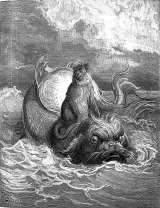The Monkey and the Dolphin
The Monkey and the Dolphin is a fable by Jean de La Fontaine that explores the theme of honesty and deceit. When a monkey is saved from drowning by a dolphin, he lies about being the king of the monkeys to gain his rescuer's favor. However, his false claims are soon exposed, leading to dire consequences. The tale teaches readers about the importance of honesty, the dangers of false pretense, and the inevitable exposure of deceit.
It was a custom with the Greeks For travellers by sea to take Monkeys and fancy dogs, whose tricks Would pastime in fair weather make. A vessel with such things on deck, Not far from Athens, went to wreck; But for the Dolphins all had drowned. This animal is friend to man: The fact in Pliny may be found; So must be true, say what you can. A Dolphin half the people saves, Even a Monkey, by-the-by, He thought a sailor, from the waves He kindly helped: the creature sly, Seated upon the Dolphin's back, Looked very grave and wise; good lack! One would have really almost sworn T'was old Arion, all forlorn. The two had nearly reached the land, When just by chance, and such a pity! Fish asks, "Are you from Athens grand?" "Yes; oh, they know me in that city; If you have any business there, Employ me; for it is truly where My kinsfolk hold the highest place. My second cousin is Lord Mayor." The Dolphin thanked him with good grace: "And the Piræus knows your face? You see it often, I dare say?" "See him! I see him every day; An old acquaintance; that is so." The foolish chatterer did not know Piræus was a harbour, not a man. Such people, go where'er you can, You meet within a mile of home, Mistaking Vaugirard for Rome, People who chattering dogmatise Of what has never met their eyes. The Dolphin laughed, and turning round The Monkey saw, and straightway found He'd saved mere shadow of humanity; Then plunged again beneath the sea, And search amid the billows made For one more worthy of his aid.
Translation
Translate and read this book in other languages:
Select another language:
- - Select -
- 简体中文 (Chinese - Simplified)
- 繁體中文 (Chinese - Traditional)
- Español (Spanish)
- Esperanto (Esperanto)
- 日本語 (Japanese)
- Português (Portuguese)
- Deutsch (German)
- العربية (Arabic)
- Français (French)
- Русский (Russian)
- ಕನ್ನಡ (Kannada)
- 한국어 (Korean)
- עברית (Hebrew)
- Gaeilge (Irish)
- Українська (Ukrainian)
- اردو (Urdu)
- Magyar (Hungarian)
- मानक हिन्दी (Hindi)
- Indonesia (Indonesian)
- Italiano (Italian)
- தமிழ் (Tamil)
- Türkçe (Turkish)
- తెలుగు (Telugu)
- ภาษาไทย (Thai)
- Tiếng Việt (Vietnamese)
- Čeština (Czech)
- Polski (Polish)
- Bahasa Indonesia (Indonesian)
- Românește (Romanian)
- Nederlands (Dutch)
- Ελληνικά (Greek)
- Latinum (Latin)
- Svenska (Swedish)
- Dansk (Danish)
- Suomi (Finnish)
- فارسی (Persian)
- ייִדיש (Yiddish)
- հայերեն (Armenian)
- Norsk (Norwegian)
- English (English)
Citation
Use the citation below to add this book to your bibliography:
Style:MLAChicagoAPA
"The Monkey and the Dolphin Books." Literature.com. STANDS4 LLC, 2025. Web. 22 Feb. 2025. <https://www.literature.com/book/the_monkey_and_the_dolphin_2517>.








Discuss this The Monkey and the Dolphin book with the community:
Report Comment
We're doing our best to make sure our content is useful, accurate and safe.
If by any chance you spot an inappropriate comment while navigating through our website please use this form to let us know, and we'll take care of it shortly.
Attachment
You need to be logged in to favorite.
Log In